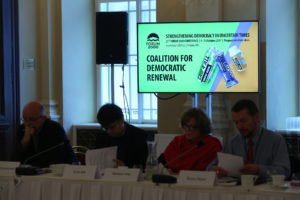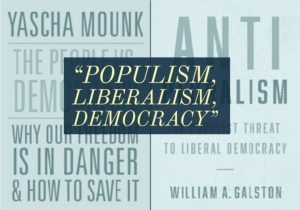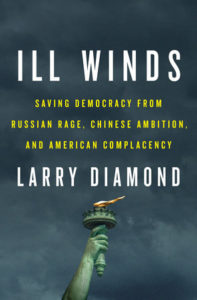
21st Forum 2000 Conference
The emergence of populism reflects severe problems with representation and accountability in democracies worldwide. However, despite potentially increasing the representativeness of a country’s politics, populists in government increase the risk of democratic breakdown even in a class of previously immune wealthy democracies, according to a new Wilson Center analysis.
Populism offers the promise of democratic renewal, bringing new actors and policies into the political system. But while populist parties in power can make politics more representative, they can undermine accountability when their lack of ability or interest in legislating shifts policy-making to other actors outside the ruling party, argues Patrick Liddiard, formerly an analyst for the National Security Council’s processes on Democracy, Human Rights, and Governance.
 Populists in government can also erode the institutional checks on executive power necessary for durable democracy, even in previously resilient advanced democracies, and populist mobilization has precipitated democratic breakdown in the wealthiest democracies to ever revert to autocracy: Turkey, Venezuela, and Thailand, he writes in Is Populism Really a Problem for Democracy?:
Populists in government can also erode the institutional checks on executive power necessary for durable democracy, even in previously resilient advanced democracies, and populist mobilization has precipitated democratic breakdown in the wealthiest democracies to ever revert to autocracy: Turkey, Venezuela, and Thailand, he writes in Is Populism Really a Problem for Democracy?:
Populists are more likely to have future electoral success in the subregions that have weaker connections between voters and parties than other subregions: Central and Eastern Europe, Southeast Asia, the Andes, Central America, and Southern Africa. The weak formal and informal executive constraints in most of these countries would put them at risk of democratic breakdown under populist governments., Liddiard contends. RTWT
 Democratic institutions worldwide have reached a unique and precarious turning point, said Larry Diamond (author of Ill Winds…..right) on a recent episode of the World Class podcast by the Freeman Spogli Institute for International Studies (FSI), Stanford’s Alice Wenner adds:
Democratic institutions worldwide have reached a unique and precarious turning point, said Larry Diamond (author of Ill Winds…..right) on a recent episode of the World Class podcast by the Freeman Spogli Institute for International Studies (FSI), Stanford’s Alice Wenner adds:
After the Cold War, the world became dominated by liberal values and a prevailing consensus for freedom, democracy and human rights, Diamond told World Class host and FSI Director Michael McFaul. During this time, the percentage of democratic states rose from making up about a quarter to more than half of all of the independent states in the world — which had never happened before in history. However, explained Diamond, who is senior fellow at the Center on Democracy, Development and the Rule of Law, this trend may come to an end soon.
“It’s under severe challenge from Russia, China, Iran and from many other countries that were until recently democracies or are in danger of no longer being democracies soon,” Diamond said. “We are in a new and urgent situation.”
In 2018, Freedom House reported a decline in global freedom for the 13th consecutive year, reversing the post-Cold War trend between 1991 and 2006, suggesting that the world “could be on the cusp of a democratic depression,” said Diamond, co-editor of the National Endowment for Democracy’s International Forum. In his view, there are the four main causes of this global shift…RTWT







